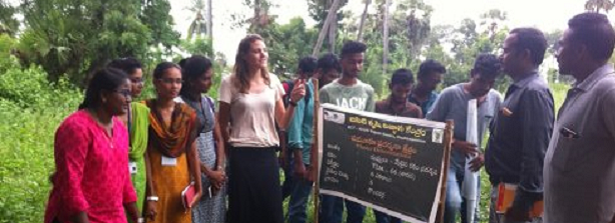Successful knowledge exchange organized by Ethiopian Sesame Business Network

How can we optimize the volume and quality of sesame production in North-Western Ethiopia? And what can we learn from other sesame-producing countries? Armed with these questions, Staff from the Sesame Business Network (SBN1) – a project co-coordinated by the Wageningen Centre for Development Innovation – travelled in three separate groups to Tanzania, Uganda and India in 2018.
Florentine Dirks, agro-economist and organizer of these ‘learning journeys’ described them as an eye opener: “The problems farmers face are often comparable, but the solutions differ from country to country. The learning journeys helped us generate new ideas, for instance, in terms of access to finance and affordable techniques to increase production. We are now trying to put these into practice.”
In each country, the group of agronomists and economists participated in a tailor-made programme of field visits, presentations and discussions with local parties and stakeholders. The agendas were for the largest part determined by local organizations with whom Dirks collaborated. They also arranged interactions with local stakeholders and all logistical matters. “A definite must, because they know the local market and circumstances like no one else. This ensured relevant contacts and an efficient programme,” Dirks says.
New methods
In particular, the Ethiopian delegation learned a lot about sesame production enhancing techniques, methods for providing training and public services and alternative forms of financing farmers. These are definitely the three biggest challenges Ethiopia faces. Dirks: “We saw several examples of simple manual or mechanical tools that make land cultivation much easier. But also how you can use affordable IT tools for providing training and public services, such as weather forecasts. And that you can cover costs, for example, by levying an additional margin on the sale of input products, such as fertilizers. In Ethiopia, we are struggling with this due to the large number of households, the limited infrastructure and the farmers’ minimal financial capacity.”
‘Warehouse-receipt system’
Access to finance is a problem for many farmers, which heavily impacts all other challenges mentioned. According to Dirks, it is crucial to have several solutions on hand, in addition to loans. Tanzania does just that: via for example the warehouse-receipt system. This means that farmers first store their grain in a warehouse as security, and thus buy themselves time to determine the most opportune time to sell and the best sales channels to generate additional income. The warehouse stock can simultaneously serve as security for loans.
Application in Ethiopia
Back in their own country, the three delegations shared their experiences and started pondering the question of how these examples can be applied in the Ethiopian context. Together with an agri-finance expert, they looked into the ‘warehouse-receipt system’, for instance. Dirks: “We immediately recognized the benefit of the contacts that had been made. Since then, adjusting and requesting additional information has become a lot easier.”
Thinking outside the box
In short, the exchange was a success for both the Ethiopian delegation and the receiving parties. Dirks: “This was very motivating for the staff and an excellent opportunity to stimulate out of the box thinking. Not only were we exposed to other solutions, but also to the accompanying context and culture. We certainly benefited from this, because learning opportunities like this do not get organized easily and often staff is dependent on learning from daily practice or good old desk research. With these trips, we were able to enrich our practical knowledge and receive fresh input for new, creative solutions.”
_ _ _
Source: Wageningen Centre for Development Innovation
Footnotes
- 1. The full name of this project, is “Benefit-SBN”, in this text SBN is used as an abbreviation.






